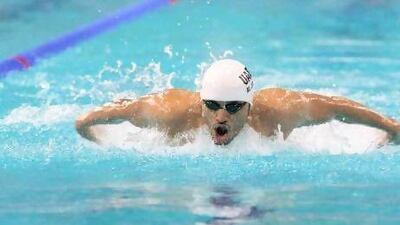China's domination of the first four days of the Asian Swimming Championships have provided an easy excuse for those looking to explain why the 15,000 seats at the Hamdan bin Mohammed bin Rashid Sports Complex remain empty. After all, nobody enjoys a sporting contest when the outcome is so obvious, right?
Yet to make such a claim would be to imply that had China not proved superior to all before them, the bleachers would be bustling and the likes of Obaid Al Jasmi and his Emirati compatriots would be enjoying vocal support. Nonsense. If London struggled to fill its National Aquatics Centre during this summer's Olympic Games, there was never any likelihood of this continental showpiece proving a sell-out. And Great Britain had athletes capable of taking gold.
The issue here with swimming is that while it can be a tense and enthralling spectator sport, it suffers from a lack of genuine interest. It has been written within these pages time and again that until the UAE produces a genuine local hero - regardless of the sport - attendances at such events will suffer. Had Mubarak Salem won gold in London would more than the handful of people who turned out on Friday morning have come this weekend? You would certainly hope so.
China greeted capacity crowds at the Water Cube in 2008, an understandable achievement given the country's population and the number of outstanding athletes they had taking part.
They have continued to go from strength to strength, taking five golds in London and proving their prowess in the pool once again in Dubai claiming 33 of the 38 gold medals on offer.
China has not always proved so superior though and it is not absurd to assume, at some level, their dominance is linked to the support their athletes were shown in their formative years.
In Athens 2004, China took one silver and one bronze, while in Beijing they took a gold, three silvers and a bronze. At this year's Games, they took eight medals in total and have this week appeared simply too good for the rest of Asia.
China's superiority here is not surprising considering they and Japan share 37 of the 40 Asian records and the latter have left the majority of their Olympians at home resting ahead of next month's Short Course World Championships in Istanbul.
Yet it is the acknowledgement of Taha Al Kishry, the director general of the Asian Swimming Federation, that is most concerning. The Omani believes the whole of West Asia is already more than five years behind East Asia in terms of athlete development. He told The National negotiations are ongoing with association presidents regarding the possible formation of a West Asian or Arab federation in the hope of developing swimmers' talents from an earlier age.
On Saturday evening, shortly before China's Sun Yang completed his third event in three days and took a third gold, Xu Danlu, a 13-year-old Chinese female, broke the 400m freestyle Asian Championship record by more than five seconds. It was a phenomenal performance by such a young athlete and a perfect example of what is possible with belief and support.
In July 2001, when Beijing was confirmed as host city of the 2008 Olympics, Xu was probably yet to even enter a pool. Now she is almost certainly bound for Rio de Janeiro in 2016.
It is unimaginable to think her country's hosting of the Games did not motivate her more, while also providing the support required to hone her talents.
Now, with the Hamdan Complex, the UAE has an aquatics centre equal to Beijing's, or any in the world.
If Emirati youngsters cannot find motivation to learn and compete with the support of such a tremendous facility, breakthroughs by local swimmers are unlikely, as are big crowds at events like these.
gmeenaghan@thenational.ae
Follow us

